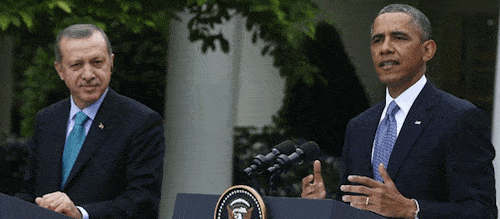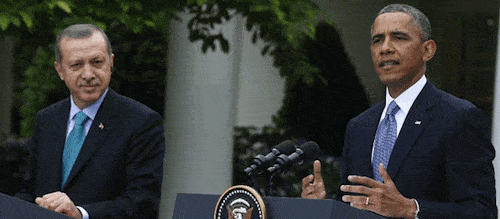Just fourteen years after al-Qaeda attacked New York, the New York Times is wondering why the Obama Administration is not cooperating more closely with al-Qaeda.
Of course they don’t put it quite that way. In an article posted yesterday, the “paper of record” first builds up an impressive new fighting group in Syria that is, as they say, a “potential ally” of the United States, but that the Administration has for some reason found “challenging” to openly embrace:
A rebel group with thousands of fighters, political clout and close ties to key regional powers has emerged as one of the most powerful opposition forces in Syria in recent months. It has vowed to fight the Islamic State and called for engagement with the West.
But despite a long struggle by the United States to find a viable opposition in Syria to counter President Bashar al-Assad and fight the Islamic State, the Obama administration has shown no interest in working with the group, Ahrar al-Sham, or the Free Men of Syria.
A powerful force, ties to key regional powers, vows to fight both ISIS and Assad, calls for “engagement” with the West, and it even has a name straight out of Hill & Knowlton: the “Free Men of Syria.” What’s not to like? The New York Times presents it as a dream come true.
You have to look below the fold to see the slight glitch:
Ahrar al-Sham cooperates with the Syrian affiliate of Al Qaeda and has welcomed former associates of Osama bin Laden.
Is that all? This must be the part that poses a “challenge” to the Administration. How to embrace al-Qaeda without being seen to embrace al-Qaeda.
The Times does slightly nod to the uncomfortable history of US support for violent Islamist extremists:
Clear in the minds of American leaders is the history of those mujahedeen supported by the United States in Afghanistan in the 1980s who later formed Al Qaeda
Yes al-Qaeda. And that whole 9/11 thing. But of course that is old history and the current crisis for the foreign policy experts in Washington to solve is how to get rid of Assad. Still, PR problems remain:
A recent promotional video quotes Abdullah Azzam, Bin Laden’s mentor in Afghanistan. And Hassan Aboud, the group’s first leader, has called for the establishment of an Islamic government in Syria.
The Times quotes an “unnamed Administration official” saying, “[a]s long as they remain close to Nusra [al-Qaeda in Syria], I can’t see us working with them.”
Well, at least not openly.
US allies in the region are not so squeamish about the bad PR that might come from actively supporting al-Qaeda. Turkey, for example, has long openly supported Ahrar al-Sham. Shortly after the “Arab Spring” overthrow of Assad that Ankara supported, the Turkish government realized that there was simply no homegrown military force capable of overthrowing the popular Assad regime. So it turned to Islamists with their dreams of an Islamic State encompassing much of the region.
According to an International Business Times piece today, quoting the neocon Institute for the Study of War:
Turkey ‘seems to have chosen a house to [publicly] back in Syria,’ said Jennifer Cafarella, a Syria analyst at the Institute for the Study of War. ‘Ankara has worked closely enough with Ahrar — empowering the group not just as a fighting force, but also as a political actor — that Ankara has assumed a degree of ownership over Ahrar’s overarching political project,’ War on the Rocks reported last week.
So the US government to this point will not publicly embrace al-Qaeda’s allies in Syria, but it will forge an ever-closer military alliance with a Turkish regime that openly supports the organization, has “deep ties,” and empowers the al-Qaeda affiliated group as a fighting force. Just this month the US announced it would conduct joint airstrikes with the Turkish military from Turkish soil. If the Obama Administration had a problem with the embrace of al-Qaeda might it not make that problem known to the group’s biggest supporter, Turkey?
While there is a great irony in the New York Times wondering why the Obama Administration doesn’t cozy up more openly to an al-Qaeda ally in Syria, in fact it does make some sense. The CIA has long been training jihadists to take down Assad. Why keep secret what everyone already knows?
But a friendly word of advice to both the New York Times and Turkey — be careful: According to the original authorization for the use of military force signed into law after the 9/11 attacks:
…the President is authorized to use all necessary and appropriate force against those nations, organizations, or persons he determines planned, authorized, committed, or aided the terrorist attacks that occurred on September 11, 2001, or harbored such organizations or persons (emphasis added)
And worse, the 2012 NDAA authorizes indefinite detention or even drone strikes against:
A person who was a part of or substantially supported al-Qaeda, the Taliban, or associated forces (emphasis added) that are engaged in hostilities against the United States or its coalition partners, including any person who has committed a belligerent act or has directly supported such hostilities in aid of such enemy forces.
Yes that may sound silly because these groups did not even really exist in 2001 so how could they harbor those who were responsible for the 9/11 attack or be considered “associated forces?” But the Obama Administration has based its entire legal rationale for its (illegal) bombing of Syria on that same 2001 Authorization for the Use of Military Force. Their rules. Bombs away, NYT and Turkey! Take cover!


